Articles
AMENDMENTS TO
MUSLIM MARRIAGE AND DIVORCE ACT
The Muslim Community in Sri Lanka used to have issues every now and then in the past. But nowadays facing issues is the order of the day for the Muslims. Different kinds of issues from numerous quarters at various levels confront the Muslims from all walks of life in every nook and cranny of this gorgeous island.
The latest phenomenon is the amendments to the Muslim Marriage and Divorce Act. The scenario starts with a 323 page report produced by a committee appointed in 2009 to consider amendments to the MMDA.
Mr. Milinda Moragoda, then Minister of Justice and Law Reforms appointed a committee of experts in 2009 to suggest amendments to the Muslim Marriage and Divorce Act No.: 13 of 1951. This Committee comprised nineteen eminent members, an assortment of diverse academic backgrounds. Most of them are from bench and bar and three Muslim theologians.
This high-powered Committee took nearly nine years to complete its task and finally submitted its lengthy report in 323 pages including the annexures to Mrs. Thalatha Athukorale, Minister of Justice in 2018.
Upon receipt of the report, the Ministry of Justice published same on its official website and called for comments from the general public on the report. It was announced on the same site that the report consists of two sets of recommendations. While going through the report, it was noticed that the Committee members had difference of opinions in considering certain matters for recommendation which drove them to submit two sets of recommendations.
The said two sets of recommendations became the talk of the town among the scholars and social activists and arguments for and against some recommendations cropped up. Consequently there were agitations and lobbies by interested individuals and institutions in social fora and mosques and on streets.
At this juncture, the things took a different turn out of the blue when the Minister of Justice asked the Muslim Parliamentarians to study the report and both sets of recommendations therein contained and to suggest final and unified recommendations for her to take steps to bring in amendments to the MMDA.
The Muslim MPs held a meeting on 11.07.2019, discussed about the report and especially the recommendations and eventually took some decisions particularly in terms of the recommendations where the Committee could not arrive at harmonious decisions.
When the upshot of the meeting of the Muslim parliamentarians became known to the general public, their involvement in this matter was not welcomed and a fresh argument popped up. This time the public outcry was mainly due to the involvement of the politicians without consulting the Muslim theologians.
Having given the above recital, I wish to express my personal views which I formed independently following my perusal of the report of the Committee and its annexures and both sets of recommendations.
01. The report has apparently covered most of the areas where changes are required.
02. The amendments proposed in the report are justified from the angle of reality.
03. Issues and problems are thrashed out in the report.
04. Novel and progressive ideas are suggested in the report.
05. Implementation of law and its practicality at various levels are the focal points of the report.
06. It has been the practice of the successive governments to constitute special committees as and when needed to consider amendments to the Muslim Personal Law (MMDA included). The chief reason to appoint such a special committee is to invite, collect and collate public opinions and proposals, study such views and proposals within the ambit of Shari’ah principles taking into account the practicality of application, pick and choose the best ones and prepare and submit one and unified report which will contain one and unified set of proposals. A professional and foolproof way that everyone likes. But this time sadly a report was submitted with two sets of recommendations and the whole purpose was lost. Had it been one set of recommendations, there would have been no public outrage and relevant authorities would have taken measures to cause amendments to the MMDA.
07. Prevalence of different opinions in any matter is natural and unavoidable. When it comes to law and interpretation, it is still worse. So the Committee should have discussed and devised a mechanism at the very beginning to deal with matters engulfed by different opinions and to make decisions with a view to giving unified recommendations. I wonder if this kind of arrangement was made by the Committee at the outset. I did not come across any discussion about such an arrangement in the report. Had this been done, there would have been no need to have two set of recommendations.
08. Academic discourses adorn many pages of the report. Discourses are sometimes based on Qur’anic verses and Hadeeses, sometimes on rulings, statements and observations of imams, sometimes on Math-habs and sometimes on the utterances of present-day scholars. But it is unfortunate that no Principles of Jurisprudence have been followed in dealing with Qur’anic verses and Hadeeses, rulings, statements and observations of imams and Math-habs. If Principles of Jurisprudence are not strictly adhered to when treating such things, you will end up in an open error. You will be under the impression that you are doing a right thing whereas you are doing a wrong thing.
09. Under the circumstances, we are left with the following options:
a. The same Committee can sit again and prepare one and unified set of recommendations, or
b. A fresh committee be appointed with the blessing of the Minister of Justice and Muslim MPs and such a committee has to study the report and particularly both sets of recommendations in hand and produce a unified set of recommendations.
I wish to state that these are some of my personal views. I did not articulate all my views due to lack of time. With all due respect to all the members of the Committee including its Chairman Justice Saleem Marsoof, PC, I have aired my opinions.
I would like to take this opportunity to commend and thank the nineteen member Committee on my behalf and on behalf of the community for its valuable and tiresome work.
The MMDA in its present form looks fine. But the changes that have occurred in the society and lifestyle indeed necessitate amendments to it. I have been talking about bringing in changes to the MMDA for well over fifteen years. I am certainly happy that the report produced by this Committee contemplates such changes.
Any attempt by anyone in the future with regard to bringing about amendments to the Muslim Personal Law including the MMDA must be based on the sources of Shari’ah according to the Principles of Jurisprudence taking into consideration the ground situation and reality and practicality of implementing the law once enacted.
Ulama are the authority on the Islamic Law and its interpretation lies with them. Lawyers are the authority on the general law and its interpretation lies with them. When committees are constituted for the purpose of suggesting reforms in the Muslim Personal Law (MMDA included), a sufficient number of ulama and lawyers must be appointed in order to get a highly professional job. Presence of ulama in adequate number in such committees ought to be ensured. The interpretation of the Islamic Law should be left to ulama and the interpretation of the general law should be left to lawyers.
May the MMDA have necessary amendments that are beneficial and commendable!
Haniffa Abdul Nazar
23.07.2019
The latest phenomenon is the amendments to the Muslim Marriage and Divorce Act. The scenario starts with a 323 page report produced by a committee appointed in 2009 to consider amendments to the MMDA.
Mr. Milinda Moragoda, then Minister of Justice and Law Reforms appointed a committee of experts in 2009 to suggest amendments to the Muslim Marriage and Divorce Act No.: 13 of 1951. This Committee comprised nineteen eminent members, an assortment of diverse academic backgrounds. Most of them are from bench and bar and three Muslim theologians.
This high-powered Committee took nearly nine years to complete its task and finally submitted its lengthy report in 323 pages including the annexures to Mrs. Thalatha Athukorale, Minister of Justice in 2018.
Upon receipt of the report, the Ministry of Justice published same on its official website and called for comments from the general public on the report. It was announced on the same site that the report consists of two sets of recommendations. While going through the report, it was noticed that the Committee members had difference of opinions in considering certain matters for recommendation which drove them to submit two sets of recommendations.
The said two sets of recommendations became the talk of the town among the scholars and social activists and arguments for and against some recommendations cropped up. Consequently there were agitations and lobbies by interested individuals and institutions in social fora and mosques and on streets.
At this juncture, the things took a different turn out of the blue when the Minister of Justice asked the Muslim Parliamentarians to study the report and both sets of recommendations therein contained and to suggest final and unified recommendations for her to take steps to bring in amendments to the MMDA.
The Muslim MPs held a meeting on 11.07.2019, discussed about the report and especially the recommendations and eventually took some decisions particularly in terms of the recommendations where the Committee could not arrive at harmonious decisions.
When the upshot of the meeting of the Muslim parliamentarians became known to the general public, their involvement in this matter was not welcomed and a fresh argument popped up. This time the public outcry was mainly due to the involvement of the politicians without consulting the Muslim theologians.
Having given the above recital, I wish to express my personal views which I formed independently following my perusal of the report of the Committee and its annexures and both sets of recommendations.
01. The report has apparently covered most of the areas where changes are required.
02. The amendments proposed in the report are justified from the angle of reality.
03. Issues and problems are thrashed out in the report.
04. Novel and progressive ideas are suggested in the report.
05. Implementation of law and its practicality at various levels are the focal points of the report.
06. It has been the practice of the successive governments to constitute special committees as and when needed to consider amendments to the Muslim Personal Law (MMDA included). The chief reason to appoint such a special committee is to invite, collect and collate public opinions and proposals, study such views and proposals within the ambit of Shari’ah principles taking into account the practicality of application, pick and choose the best ones and prepare and submit one and unified report which will contain one and unified set of proposals. A professional and foolproof way that everyone likes. But this time sadly a report was submitted with two sets of recommendations and the whole purpose was lost. Had it been one set of recommendations, there would have been no public outrage and relevant authorities would have taken measures to cause amendments to the MMDA.
07. Prevalence of different opinions in any matter is natural and unavoidable. When it comes to law and interpretation, it is still worse. So the Committee should have discussed and devised a mechanism at the very beginning to deal with matters engulfed by different opinions and to make decisions with a view to giving unified recommendations. I wonder if this kind of arrangement was made by the Committee at the outset. I did not come across any discussion about such an arrangement in the report. Had this been done, there would have been no need to have two set of recommendations.
08. Academic discourses adorn many pages of the report. Discourses are sometimes based on Qur’anic verses and Hadeeses, sometimes on rulings, statements and observations of imams, sometimes on Math-habs and sometimes on the utterances of present-day scholars. But it is unfortunate that no Principles of Jurisprudence have been followed in dealing with Qur’anic verses and Hadeeses, rulings, statements and observations of imams and Math-habs. If Principles of Jurisprudence are not strictly adhered to when treating such things, you will end up in an open error. You will be under the impression that you are doing a right thing whereas you are doing a wrong thing.
09. Under the circumstances, we are left with the following options:
a. The same Committee can sit again and prepare one and unified set of recommendations, or
b. A fresh committee be appointed with the blessing of the Minister of Justice and Muslim MPs and such a committee has to study the report and particularly both sets of recommendations in hand and produce a unified set of recommendations.
I wish to state that these are some of my personal views. I did not articulate all my views due to lack of time. With all due respect to all the members of the Committee including its Chairman Justice Saleem Marsoof, PC, I have aired my opinions.
I would like to take this opportunity to commend and thank the nineteen member Committee on my behalf and on behalf of the community for its valuable and tiresome work.
The MMDA in its present form looks fine. But the changes that have occurred in the society and lifestyle indeed necessitate amendments to it. I have been talking about bringing in changes to the MMDA for well over fifteen years. I am certainly happy that the report produced by this Committee contemplates such changes.
Any attempt by anyone in the future with regard to bringing about amendments to the Muslim Personal Law including the MMDA must be based on the sources of Shari’ah according to the Principles of Jurisprudence taking into consideration the ground situation and reality and practicality of implementing the law once enacted.
Ulama are the authority on the Islamic Law and its interpretation lies with them. Lawyers are the authority on the general law and its interpretation lies with them. When committees are constituted for the purpose of suggesting reforms in the Muslim Personal Law (MMDA included), a sufficient number of ulama and lawyers must be appointed in order to get a highly professional job. Presence of ulama in adequate number in such committees ought to be ensured. The interpretation of the Islamic Law should be left to ulama and the interpretation of the general law should be left to lawyers.
May the MMDA have necessary amendments that are beneficial and commendable!
Haniffa Abdul Nazar
23.07.2019
More Articles:
*Behaviour shaping strategies in islam
*Misunderstanding of Islam; Cause for Islamophobia
*Capital punishment an islamic perspective
*Shari’ah Supervision in Islamic Banks and Financial Institutions
*Major Sins; a Brief Discussion
*Criticize the Way Law was Implemented not the Law
* 47 YEARS OLD
* AMENDMENTS TO MUSLIM MARRIAGE AND DIVORCE ACT
* BRINGING ABOUT REFORMS TO MUSLIM MARRIAGE AND DIVORCE ACT
* AMENDMENTS TO MUSLIM MARRIAGE AND DIVORCE ACT - PART 01
* AMENDMENTS TO MUSLIM MARRIAGE AND DIVORCE ACT - PART 02
* ARTICLES WRITTEN BY MARHOOM M.M.M. MAHROOF ON MUSLIM PERSONAL LAW IN SRI LANKA
* HALAL AND HARAM IN FOOD AND BEVERAGE
* WHAT LOVE CAN DO
* QUALITY POLITICIANS
* THANKS FOR CONDOLENCES
* DO NOT SAY ‘MUBAARAKALLAH’
* REGULATING AND STANDARDIZING MADRASAHS
* QUAZI SYSTEM AN ISSUE IN HAND
*Behaviour shaping strategies in islam
*Misunderstanding of Islam; Cause for Islamophobia
*Capital punishment an islamic perspective
*Shari’ah Supervision in Islamic Banks and Financial Institutions
*Major Sins; a Brief Discussion
*Criticize the Way Law was Implemented not the Law
* 47 YEARS OLD
* AMENDMENTS TO MUSLIM MARRIAGE AND DIVORCE ACT
* BRINGING ABOUT REFORMS TO MUSLIM MARRIAGE AND DIVORCE ACT
* AMENDMENTS TO MUSLIM MARRIAGE AND DIVORCE ACT - PART 01
* AMENDMENTS TO MUSLIM MARRIAGE AND DIVORCE ACT - PART 02
* ARTICLES WRITTEN BY MARHOOM M.M.M. MAHROOF ON MUSLIM PERSONAL LAW IN SRI LANKA
* HALAL AND HARAM IN FOOD AND BEVERAGE
* WHAT LOVE CAN DO
* QUALITY POLITICIANS
* THANKS FOR CONDOLENCES
* DO NOT SAY ‘MUBAARAKALLAH’
* REGULATING AND STANDARDIZING MADRASAHS
* QUAZI SYSTEM AN ISSUE IN HAND
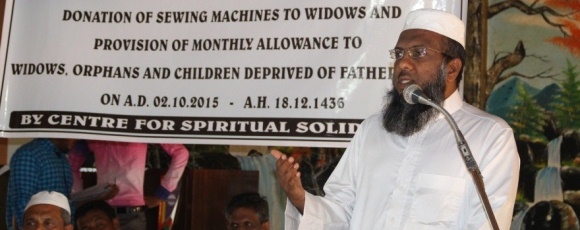
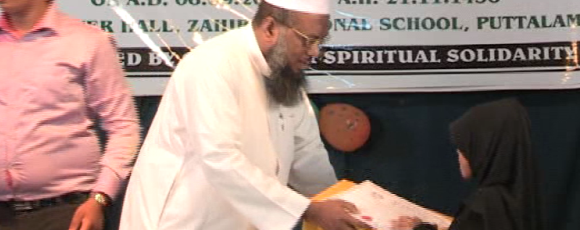
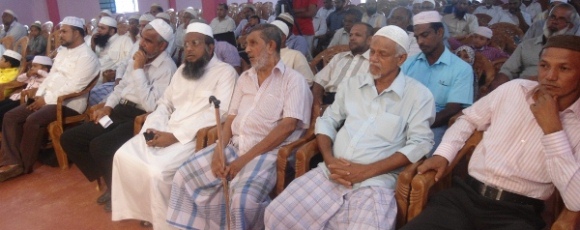
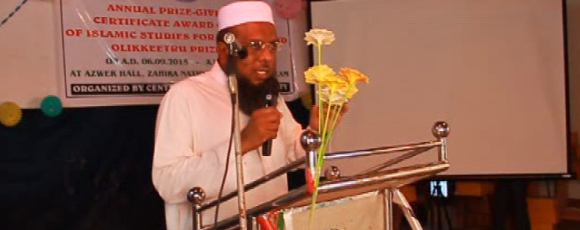
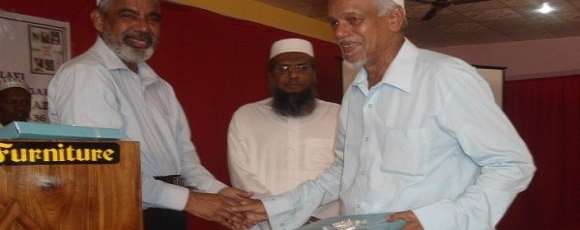
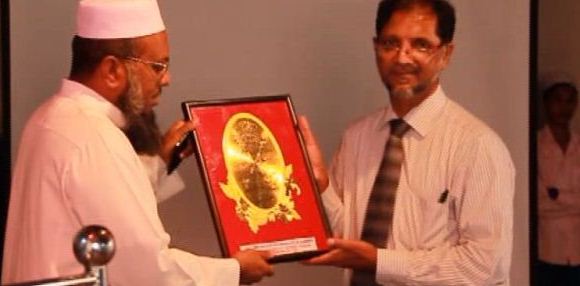










 Jumuah Khutbah
Jumuah Khutbah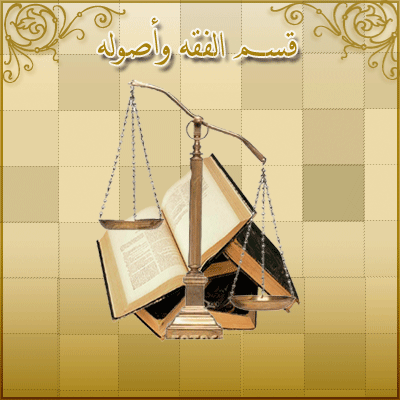 Weekly Fiqh Class for Adults
Weekly Fiqh Class for Adults Special address At prize-giving
Special address At prize-giving
